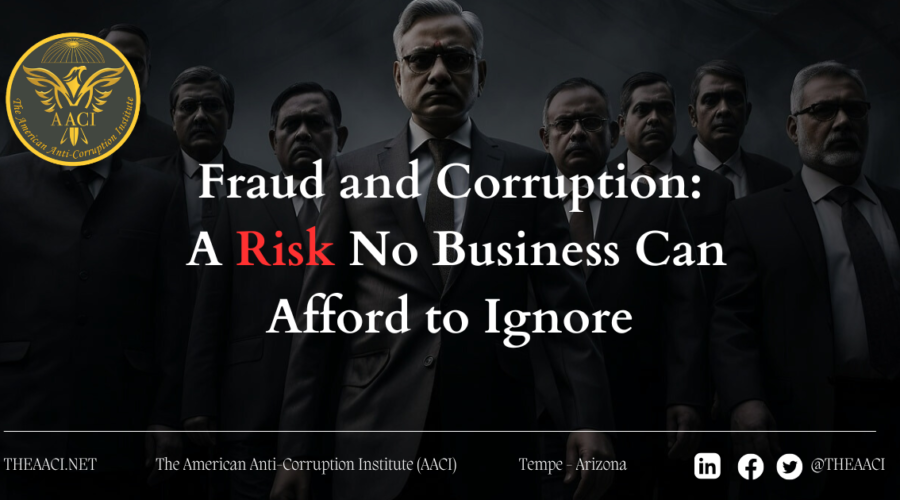Technical Staff
October 23, 2024
Key Takeaways
1. Fraud and corruption can happen in any business: No company, regardless of size or structure, is immune.
2. Financial, reputational, and operational damages are real risks: Ignoring corruption exposes businesses to severe consequences.
3. Investment in fraud and corruption prevention is essential: Proactive measures safeguard the business and build long-term trust.
4. Leaders who prioritize ethics and integrity benefit: Companies that invest in corruption prevention experience enhanced reputation, reduced risks, and stronger business performance.
Many business leaders and owners believe that fraud and corruption are issues reserved for larger corporations or countries with weaker governance structures. They feel insulated, and confident in their internal controls and the trust they place in their team members. Unfortunately, this mindset is far from the truth.
Fraud and corruption do not discriminate. They occur in companies of all sizes, across all industries, and in every region of the world. Whether your company is a local enterprise or a multinational corporation, the potential for fraud and corruption exists — and it’s closer than you think.
The Dangerous Assumption: “It Can’t Happen Here”
The belief that fraud and corruption won’t happen in your company is a risky assumption. In fact, such confidence often blinds decision-makers to early signs of wrongdoing. The reality is that many businesses that have fallen victim to fraud shared this same belief — until it was too late.
Corruption can quietly thrive in environments where controls are seen as unnecessary, and management assumes that employees and partners will always act in good faith. However, research and case studies repeatedly show that no company is immune. Fraud can originate from unexpected places: trusted employees, partners, or vendors can find ways to exploit weaknesses in oversight, leading to devastating consequences.
The Real Cost: Financial and Reputational Damage
When fraud strikes, the financial damage can be staggering. It ranges from the immediate loss of funds to long-term impacts such as decreased revenue due to damaged client relationships, costly legal battles, and even regulatory fines. But it doesn’t stop there.
The reputational damage is often the hardest to recover from. In today’s interconnected world, news of corruption spreads fast. Clients lose trust, business partners become hesitant, and potential deals fall through as your company’s image takes a hit. Once your reputation is tarnished, rebuilding it can take years, if not decades — if recovery is possible at all.
Moreover, the hidden costs of operational disruptions, morale decline, and reduced employee productivity further compound the loss. All of these factors erode the foundation of a successful business, turning a once-profitable operation into a struggling entity.
Why Investing in Prevention is a Smart Business Decision
For those who still believe that corruption is not a pressing issue for their business, the question must be asked: Can you afford the risk?
The good news is that taking steps to prevent fraud and corruption doesn’t just protect against potential losses. It also offers tangible benefits that can propel your company forward. Here are some key reasons to invest in corruption prevention:
1. Strengthen Trust with Stakeholders: Transparency and accountability build trust among clients, partners, and employees. Companies that actively demonstrate a commitment to ethical practices attract more business and foster loyalty.
2. Boost Employee Morale: A strong anti-corruption culture within the company helps create a positive working environment. Employees feel safer and more valued when they know that leadership prioritizes integrity and fairness.
3. Increase Operational Efficiency: By tightening internal controls, businesses can streamline their operations, reducing the risk of waste or inefficiencies that fraud often creates.
4. Improve Long-term Profitability: Companies that avoid costly fraud-related incidents and maintain a positive reputation enjoy a competitive advantage in their industry. They gain more opportunities, higher customer retention, and enhanced profitability.
5. Enhance Risk Management: When businesses actively address corruption risks, they become more adept at managing other types of business risks, whether operational, financial, or regulatory.
Don’t Wait Until It’s Too Late
No business is immune to fraud or corruption, and the risks of ignoring them are too great to dismiss. By taking a proactive stance, business leaders can protect their companies from potentially devastating losses, safeguard their reputations, and create a foundation for sustainable growth.
Fraud and corruption are not issues that will resolve themselves. They require diligent attention, investment, and action from leadership. The cost of prevention is always lower than the price of damage control after a scandal has unfolded.
Reasonable leaders act before disaster strikes. By believing that fraud and corruption can happen in your business — and taking steps now to address those risks — you set your company up for long-term success and resilience.











































